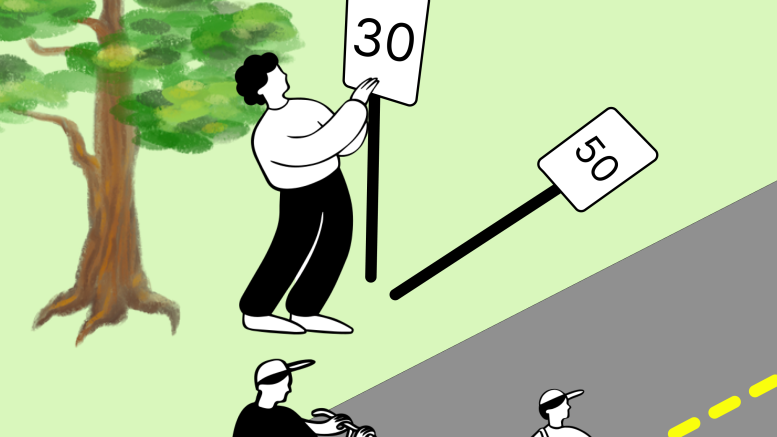Winnipeg can become a more cycling-friendly city by rapidly accelerating the implementation of 30 km/h zones in residential areas.
Safe streets are streets with a maximum 30 km/h speed limit. Analysts point to 30 km/h as the most optimal for safer speeds. A study on school zones in Edmonton found that nearly half of all serious collisions are reduced when the speed is reduced from 50 km/h to 30 km/h. In comparison, almost 9 out of 10 people hit by a car going 30 km/h will survive, versus 2 out of 10 people will survive a car driving 50 km/h.
The safe streets movement has grown locally and globally. Here in Winnipeg, citizens concerned about road safety and healthier cities while addressing social inequities and climate action have joined campaigns to advocate for more 30 km/h zones. So far, we have seen modest success, including helping push for neighborhood greenways, including Eugenie Street, in eastern Winnipeg and Harbison Avenue in Elmwood. This coalition of cyclists, urbanists, environmentalists and activists has been instrumental.
Globally, the United Nations Global Road Safety Week in 2021 called on lawmakers to implement 30 km/h streets to ensure safer neighborhoods.
Zoleka Mandela, Nelson Mandela’s granddaughter, lost her daughter in 2010 to a road collision in South Africa. She said, “so many of us around the world are taking to the streets and demanding change.” Mandela also said, “we want low speeds, we want livable streets, and communities where we can walk safely, and our children can get to school unharmed. We call for 30 km/h speed limits. Above 30 is a death sentence.”
Why should 30 km/h in residential streets be the law of the land in Winnipeg?
First, it makes us safer.
Winnipeg released its Road Safety Strategic Action Plan in 2022 to reduce serious and fatal collisions by 2026. Despite this ambitious target, last year was a dangerous year for pedestrians and cyclists, with more cycling and pedestrian deaths than in 2023 (14 pedestrians and two cyclists, including Rob Jenner on Wellington Crescent). Slow-speed streets in our city would reduce the risk of pedestrian and cyclist fatalities, making the city much safer.
Second, safe streets are the best low-hanging fruit when it comes to building out our city’s active transportation network.
As Winnipeg is expected to grow to 1 million within a decade, we cannot afford to make poor land use decisions through urban sprawl to favour the automobile as our main mode of transportation. Poor land use creates inefficient economic, environmental and health decisions for a city that simply cannot afford to.
Third, safe streets will help our city achieve its climate goals.
Currently, nearly half of the city’s carbon emissions come from transportation, with nearly 80 per cent coming from private automobile use. With the city targeting 50 per cent mode share by public transit, active transportation or ridesharing by 2050, developing 30 km/h streets would help to reach our climate goals.
Lastly, developing safe streets helps create a more equitable transportation system.
Many people in Winnipeg’s core area cycle as a mode of transportation. Ensuring more 30 km/h streets in our mature neighbourhoods would ensure the most equitable and accessible ways to get around to work, school and other trips within their daily lives.
Ian Walker of Safe Streets Winnipeg said on a recent episode of Not Necessarily the Automobile that one of the stumbling blocks in getting more 30 km/h zones in our city is that Winnipeg is a heavily car-dependent city, where people who drive frequently do not feel the same discomfort as cyclists, or pedestrians. Walker said people need to get out of their comfort zone to be more empathetic toward cyclists and pedestrians while educating people on the importance of safe streets.
Safe streets are too good on many levels for a city that needs a desperate transportation overhaul. Safe streets or bust.
Adam Johnston hosts Not Necessarily The Automobile on Thursdays at 11:30 a.m. on UMFM 101.5. He can be reached at [email protected]


